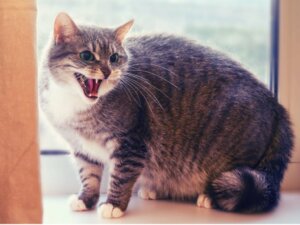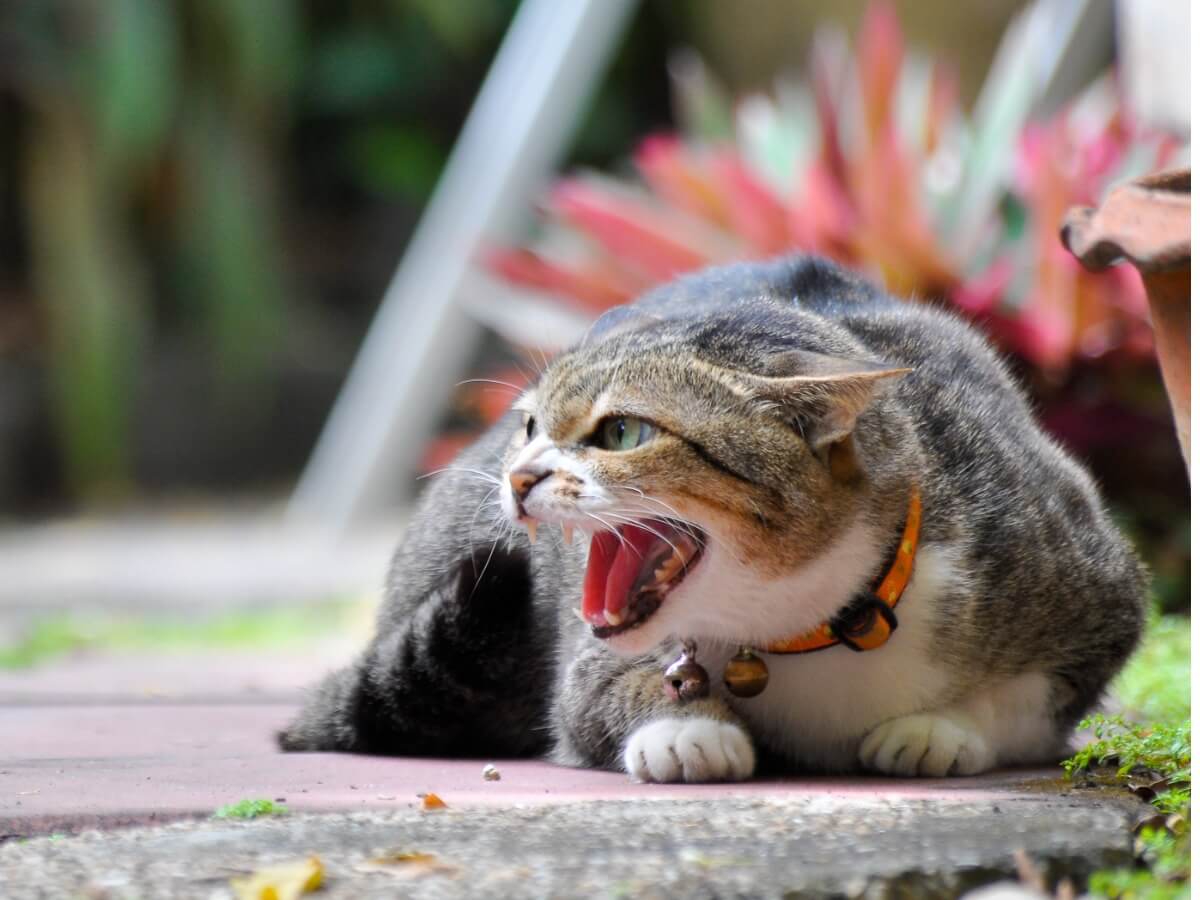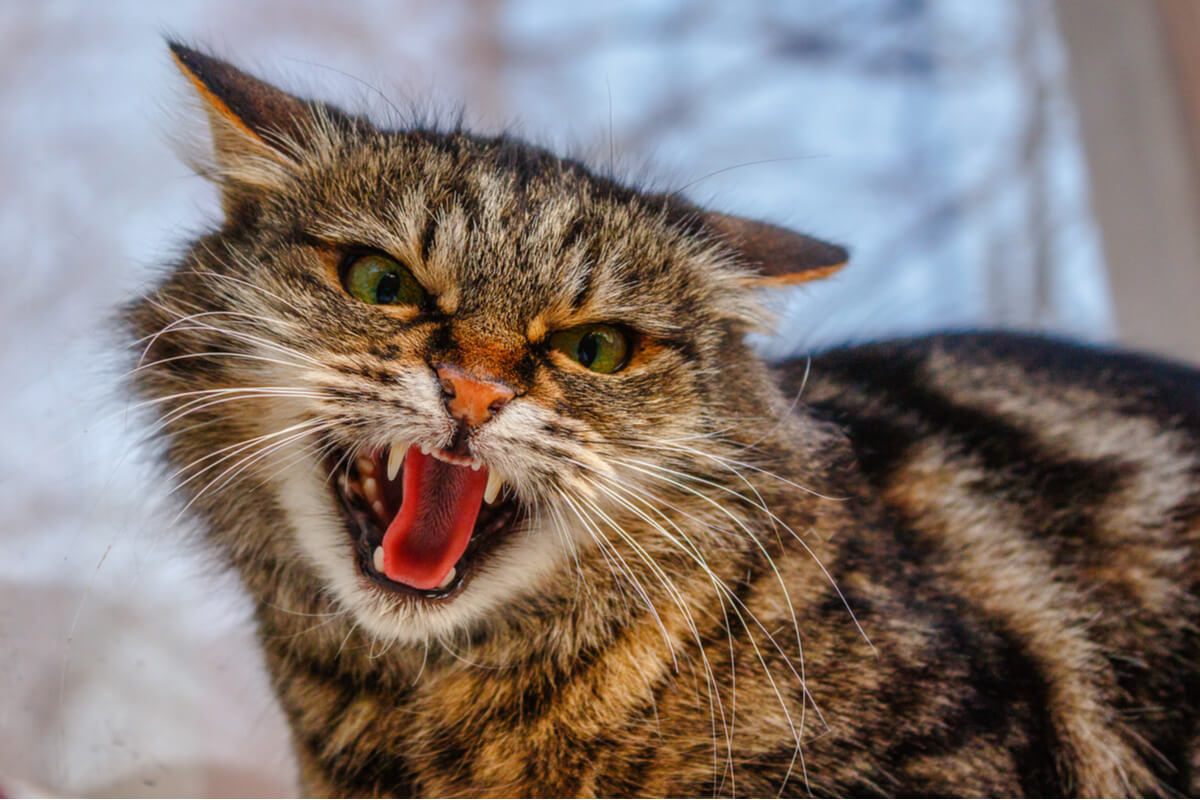12 Signs Your Cat Doesn't Love You


Written and verified by the biologist Samuel Sanchez
Domestic cats are famous for their elusive behavior and individuality. Many owners say “My cat only interacts with me when it wants to and not when I want to interact with them“. It’s normal for these animals to need their own space and require very limited attention, but their nature shouldn’t be confused with signs that your cat doesn’t love you.
Have you ever not been able to approach your cat without it hissing, bristling his hair, running away, or even hurting itself to try to escape from you. These are signs that something is wrong. However, it’s probably not a sign that your cat doesn’t love you, and it may be possible that the cat is associating you with a traumatic event or a fear in its life. Here are 12 signs that indicate a dysfunctional cat-guardian relationship.
1. Hissing
Felines use vocalizations to evoke many positive emotions, but hissing is often an indication of distress in the animal. This is characterized by the sudden exhalation of air through the mouth accompanied by a hiss that indicates a lack of confidence, anger, annoyance, uncertainty, pain or a combination of some or all of the above.
This hissing is one of the few unequivocal vocal registers in the cat, as it only has one meaning: “stay away from me.” This behavioral problem can be addressed at a time when the animal is calmer, because if you continue to insist, it’s most likely that it will attack its guardian.
2. Bristling fur
Bristling fur occurs when the small muscles at the base of each hair contract and pull it upwards. Cats bristle their fur to appear larger than they are, indicating that they’re to be feared and must appear intimidating in order for their threat to reconsider a possible attack.
If your cat constantly bristles their fur near you, that “threat” is you.
3. Other signs of fear
If you’re reading this then, most probably, there aren’t any signs that your cat doesn’t love you. It’s rather that it’s showing fearful behavior, inherited from a previous traumatic experience. In addition to the two already mentioned, the following signs are indications of fear in the animal:
- Ears turned back
- Frozen posture when there’s no obvious escape route
- Eyes wide open, with dilated pupils
- Tail under its belly
- A “lengthening” of the legs, that is, the cat stands on tiptoe to appear larger.
4. The cat doesn’t stop hiding
It’s normal for cats to require their own space, but if it hides as soon as you open the door of the house and doesn’t show itself, then this could be a sign that your cat doesn’t love you. However, it can also be the sign of an illness, as felines are more elusive if they have to hide their vulnerability due to illness.
Cats are very instinctive animals. If they feel that they can’t cope with a threat (due to fear or illness) they’ll remain out of sight.
5. Bites
Kittens often bite as part of play, as they’re developing their teething and instincts. However, an adult specimen sinking its teeth into the guardian’s arm eagerly is never a sign of fun or positive stimulation.
6. Scratching
If they’ve been with the animal for long enough, every guardian will know how to differentiate an accidental scratch from a malicious nail dig. This rapid attack is usually preceded by the aforementioned bristling and hissing, as the animal is saying that it doesn’t want the human to get any closer to it under any circumstances.
Cat scratches can lead to possible infectious diseases. Don’t let the animal attack you like that again and ask for professional help.

7. Avoidance of eye contact
In the animal world, normal behavior among humans take on completely different connotations. Constant eye contact between two competitors in a hierarchy can easily translate into a fight, so sometimes the “subordinate” looks away to avoid conflict. For this reason, staring out an angry animal is never a good idea.
Looking away is one of the signs that your cat doesn’t love you or is afraid of you.
8. This behavior is only towards you
All the cited behaviors may be generalized in the animal, which indicates a clear socialization problem or a trauma that must be overcome. However, if the cat lets himself be picked up and interacts with visitors and not with you, then it’s quite possible that the problem is with you. This doesn’t mean that you have done anything wrong, but the feline may associate you with a less than positive experience or an unpleasant smell.
9. Not feeling relaxed
A relaxed cat tends to lie down in vulnerable positions, such as belly up or curled up, and may even begin to groom itself with its tongue in front of members of the household. It will also have “pointed” ears, but closed eyes and no sign of bristling hair. If your cat doesn’t love you, it won’t carry out any of this behavior in front of you, because it doesn’t trust you.
10. Defecating outside its box
Oddly enough, another of the signs that your cat doesn’t love you is when they defecate outside the place selected by the tutor (the litter box). This sign is common in feline behavior problems. They may do this because they want to mark their territory in another area due to the feeling of threat they perceive. Alternatively, the cat may not be well.
11. Defecating and urinating on the guardian’s possessions
Although this may be accidental in some cases, if your cat pees and defecates on your possessions, it may be indicating a need for territory marking or a clear behavior problem. It isn’t that the animal hates you and pees on your things to make you angry, but that it feels stressed and acquires atypical behaviors.
12. In reality, your cat has never stopped loving you
As much as we have used this phrase throughout this article, as a final note we need to emphasize that these aren’t signs that your cat doesn’t love you as such, but that it’s not well either physically or psychologically. An animal with this type of behavior isn’t showing a lack of affection, but is telling you that something hurts, or that a traumatic experience is making it difficult for them to enjoy to enjoy living with humans.
Some of the vital situations that can trigger this problem of reluctance and fear are summarized in the following list:
- The cat has spent too much time alone and has lost the habit of interacting with humans. This is even more evident if the lack of contact occurs in the period of socialization.
- The guardian uses negative reinforcement to punish their cat, such as screaming, shaking, and even hitting. Practices like this are animal abuse and are reportable.
- The cat has had a traumatic experience on the street with humans and is generally suspicious.

As you can see, these signs indicate fear rather than a lack of love. Your cat may regain its confidence in you or another human being despite fights and past experiences, but be clear that all this behavior indicates the need to seek professional help. It isn’t that your cat doesn’t love you; they may be having a hard time physically or psychologically and need treatment.
Domestic cats are famous for their elusive behavior and individuality. Many owners say “My cat only interacts with me when it wants to and not when I want to interact with them“. It’s normal for these animals to need their own space and require very limited attention, but their nature shouldn’t be confused with signs that your cat doesn’t love you.
Have you ever not been able to approach your cat without it hissing, bristling his hair, running away, or even hurting itself to try to escape from you. These are signs that something is wrong. However, it’s probably not a sign that your cat doesn’t love you, and it may be possible that the cat is associating you with a traumatic event or a fear in its life. Here are 12 signs that indicate a dysfunctional cat-guardian relationship.
1. Hissing
Felines use vocalizations to evoke many positive emotions, but hissing is often an indication of distress in the animal. This is characterized by the sudden exhalation of air through the mouth accompanied by a hiss that indicates a lack of confidence, anger, annoyance, uncertainty, pain or a combination of some or all of the above.
This hissing is one of the few unequivocal vocal registers in the cat, as it only has one meaning: “stay away from me.” This behavioral problem can be addressed at a time when the animal is calmer, because if you continue to insist, it’s most likely that it will attack its guardian.
2. Bristling fur
Bristling fur occurs when the small muscles at the base of each hair contract and pull it upwards. Cats bristle their fur to appear larger than they are, indicating that they’re to be feared and must appear intimidating in order for their threat to reconsider a possible attack.
If your cat constantly bristles their fur near you, that “threat” is you.
3. Other signs of fear
If you’re reading this then, most probably, there aren’t any signs that your cat doesn’t love you. It’s rather that it’s showing fearful behavior, inherited from a previous traumatic experience. In addition to the two already mentioned, the following signs are indications of fear in the animal:
- Ears turned back
- Frozen posture when there’s no obvious escape route
- Eyes wide open, with dilated pupils
- Tail under its belly
- A “lengthening” of the legs, that is, the cat stands on tiptoe to appear larger.
4. The cat doesn’t stop hiding
It’s normal for cats to require their own space, but if it hides as soon as you open the door of the house and doesn’t show itself, then this could be a sign that your cat doesn’t love you. However, it can also be the sign of an illness, as felines are more elusive if they have to hide their vulnerability due to illness.
Cats are very instinctive animals. If they feel that they can’t cope with a threat (due to fear or illness) they’ll remain out of sight.
5. Bites
Kittens often bite as part of play, as they’re developing their teething and instincts. However, an adult specimen sinking its teeth into the guardian’s arm eagerly is never a sign of fun or positive stimulation.
6. Scratching
If they’ve been with the animal for long enough, every guardian will know how to differentiate an accidental scratch from a malicious nail dig. This rapid attack is usually preceded by the aforementioned bristling and hissing, as the animal is saying that it doesn’t want the human to get any closer to it under any circumstances.
Cat scratches can lead to possible infectious diseases. Don’t let the animal attack you like that again and ask for professional help.

7. Avoidance of eye contact
In the animal world, normal behavior among humans take on completely different connotations. Constant eye contact between two competitors in a hierarchy can easily translate into a fight, so sometimes the “subordinate” looks away to avoid conflict. For this reason, staring out an angry animal is never a good idea.
Looking away is one of the signs that your cat doesn’t love you or is afraid of you.
8. This behavior is only towards you
All the cited behaviors may be generalized in the animal, which indicates a clear socialization problem or a trauma that must be overcome. However, if the cat lets himself be picked up and interacts with visitors and not with you, then it’s quite possible that the problem is with you. This doesn’t mean that you have done anything wrong, but the feline may associate you with a less than positive experience or an unpleasant smell.
9. Not feeling relaxed
A relaxed cat tends to lie down in vulnerable positions, such as belly up or curled up, and may even begin to groom itself with its tongue in front of members of the household. It will also have “pointed” ears, but closed eyes and no sign of bristling hair. If your cat doesn’t love you, it won’t carry out any of this behavior in front of you, because it doesn’t trust you.
10. Defecating outside its box
Oddly enough, another of the signs that your cat doesn’t love you is when they defecate outside the place selected by the tutor (the litter box). This sign is common in feline behavior problems. They may do this because they want to mark their territory in another area due to the feeling of threat they perceive. Alternatively, the cat may not be well.
11. Defecating and urinating on the guardian’s possessions
Although this may be accidental in some cases, if your cat pees and defecates on your possessions, it may be indicating a need for territory marking or a clear behavior problem. It isn’t that the animal hates you and pees on your things to make you angry, but that it feels stressed and acquires atypical behaviors.
12. In reality, your cat has never stopped loving you
As much as we have used this phrase throughout this article, as a final note we need to emphasize that these aren’t signs that your cat doesn’t love you as such, but that it’s not well either physically or psychologically. An animal with this type of behavior isn’t showing a lack of affection, but is telling you that something hurts, or that a traumatic experience is making it difficult for them to enjoy to enjoy living with humans.
Some of the vital situations that can trigger this problem of reluctance and fear are summarized in the following list:
- The cat has spent too much time alone and has lost the habit of interacting with humans. This is even more evident if the lack of contact occurs in the period of socialization.
- The guardian uses negative reinforcement to punish their cat, such as screaming, shaking, and even hitting. Practices like this are animal abuse and are reportable.
- The cat has had a traumatic experience on the street with humans and is generally suspicious.

As you can see, these signs indicate fear rather than a lack of love. Your cat may regain its confidence in you or another human being despite fights and past experiences, but be clear that all this behavior indicates the need to seek professional help. It isn’t that your cat doesn’t love you; they may be having a hard time physically or psychologically and need treatment.
All cited sources were thoroughly reviewed by our team to ensure their quality, reliability, currency, and validity. The bibliography of this article was considered reliable and of academic or scientific accuracy.
- Understanding Your Cat’s Body Language, Purina. Recogido a 16 de agosto en https://www.purina.co.uk/articles/cats/behaviour/understanding-cats/cat-body-language
- MALTRATO Y CRUELDAD EN ANIMALES, colvema.org. Recogido a 16 de agosto en http://www.colvema.org/PDF/Maltrato.pdf
- Stoddard-Apter, S. L., & MacDonnell, M. F. (1980). Septal and amygdalar efferents to the hypothalamus which facilitate hypothalamically elicited intraspecific aggression and associated hissing in the cat. An autoradiographic study. Brain research, 193(1), 19-32.
- Tateo, A., Zappaterra, M., Covella, A., & Padalino, B. (2021). Factors influencing stress and fear-related behaviour of cats during veterinary examinations. Italian Journal of Animal Science, 20(1), 46-58.
This text is provided for informational purposes only and does not replace consultation with a professional. If in doubt, consult your specialist.








